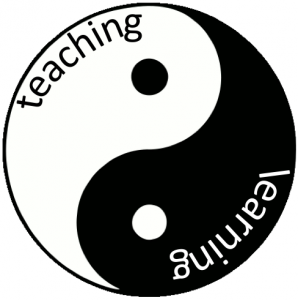My summer reading led me to enroll in Thinking Mathematically, a Coursera course offered by Stanford professor Dr. Keith Devlin. This was my first formal MOOC and I was looking forward to taking the course. Then, reality set in. The course demanded 8 to 10 hours a week and in order to get a grade, you had to view all the videos and complete the problem sets. I managed to do so for the first two weeks despite travel and vacation. This week, it looked like I would be spending most of Sunday completing the work. When an event this afternoon got cancelled, I was relieved because I could spend the time viewing the video and getting started on the assignment for the week. As I watched and worked out the problems, it occurred to me that this wasn’t the way I wanted to spend those suddenly free moments! The content is interesting and I like being challenged, but I found myself asking the age old question, “When am I going to use this?”
What did I really want to do with that free time today? Read! Paula White has been writing about the Virginia Readers’ Choice Awards and how she and her students are reading the books. Today, the National Book Award nominees were named and I would love to read a few of those. And somehow I also found Library Reads, a website that crowdsources librarians to identify the top ten books published in a month. Here’s October. Jhumpa Lahiri, “The Lowland” is on both lists. And there’s an interesting nonfiction book about a food program in Toronto.
I also want to write! I am inspired by Paula…she has been blogging every day, providing rich descriptions of her classroom, engaging book reviews and intriguing questions. From doing online coaching to teaching online courses about elearning design and online communications and working as an instructional designer for a project developing online courses to, until a few hours ago, taking an online course myself, I am immersed in online learning. There is much to think about with online learning but I seem to be living it and not making time to reflect on my work.
And, this was the first week of my community computer/tutoring program. What started as a summer conversation has resulted in a small outreach program to underserved kids in my town. The first meeting was a little chaotic as we really had no idea how many kids were coming. We ended up with a group of early elementary and middle school. I’m wondering how to engage each group: I’d like to get the first graders involved in a make project. Maybe making their own shoes? Provide materials like magazines, cardboard and foam. I’m going to dive into gaming with the middle schoolers…play a few as a basis for our conversation and then explore various tools for creating online games, starting with Scratch. Edubuntu comes with a couple programming tools like laby and kturtle.
To his credit, the professor warned us that the course would take 8 to 10 hours a week. I’m not sure why I thought I had that kind of time to devote to the course. I think I’ll just read the book.

